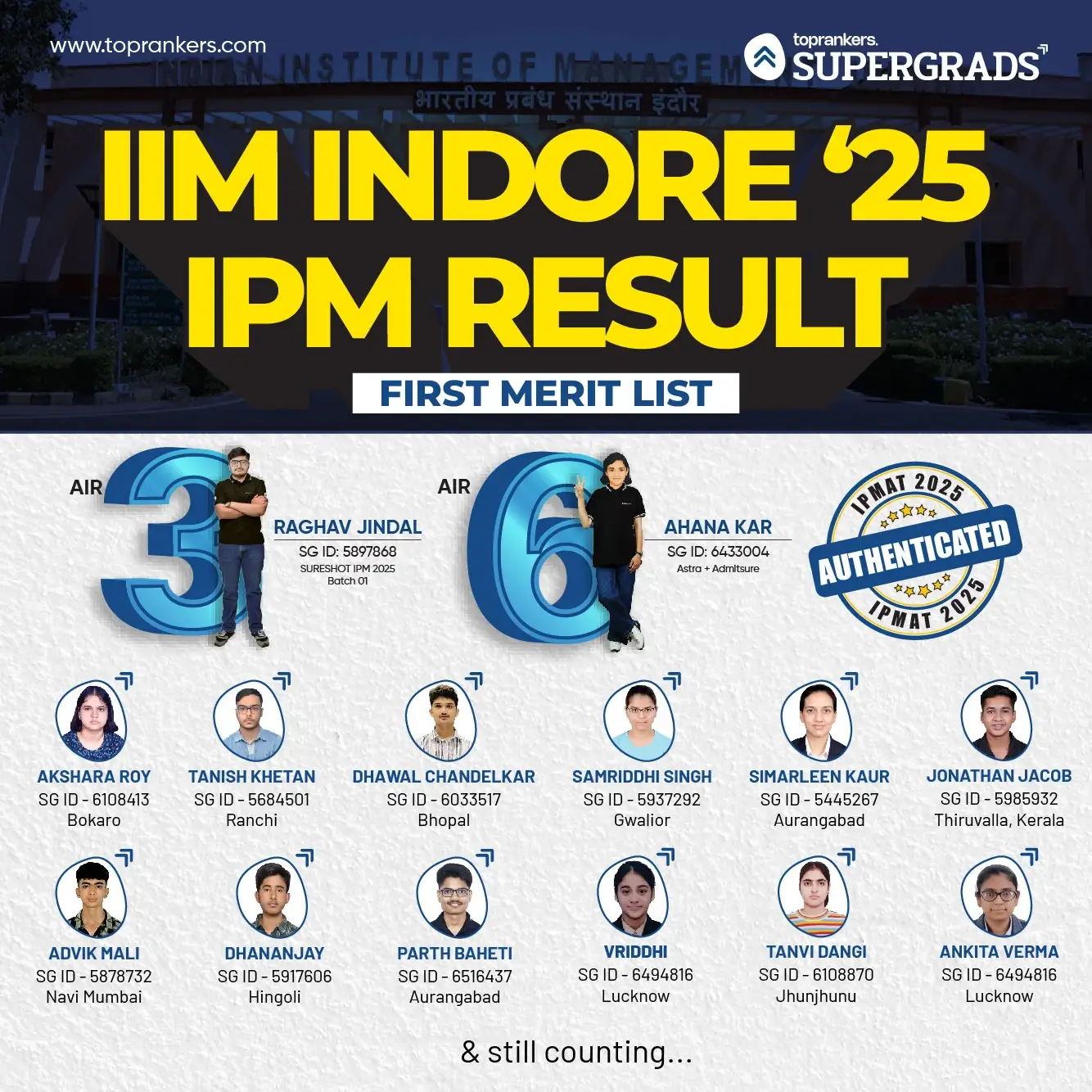IPMAT Sectional Cut-Off Calculation 2026: Tips on Sectional Cut-Off Calculations
August 19, 2025
Overview: Understand the IPMAT sectional cut-off calculation for 2026, its role in IIM Indore admissions, and master key strategies and shortcuts to clear each section.
The Indian Institute of Management, Indore (IIM Indore) conducts the Integrated Program in Management Aptitude Test (IPMAT) annually to admit students to its prestigious 5-year Integrated Program in Management.
IPMAT is not only about getting the right answers, but also about effective time management, strategic thinking, and maintaining composure.
It is essential to understand how to clear the QA cut-off to prepare effectively, as it depends on the candidates' performance, the exam's difficulty level, and the seats available through the IPMAT entrance test.
Get to know the IPMAT sectional cut-off calculation 2026, previous trends, and patterns of the exam to improve your chances of predicting the IPMAT cut-off for your attempt.
Table of Contents
What is the Sectional Cut-Off in IPMAT 2026?
IPMAT sectional cut-off refers to the minimum score a candidate must achieve in each section of the exam, such as Quantitative Ability (MCQ), Quantitative Ability (SA), and Verbal Ability, to qualify for further rounds of the selection process, including the Written Ability Test and Personal Interview.
- IPMAT Cut-off Trends: The cut-off scores for IPMAT are significantly high, indicating the intense competition among applicants.
- Sectional Cut-off Variability: Each section has distinct cut-off scores, varying greatly based on the applicant category and the specific IIM Indore.
- Category-Specific Cut-offs: Different categories (General, EWS, NC-OBC, PWD, SC, ST) have unique cut-off scores, which reflect the diverse applicant pool and help ensure a fair admission process.
- Impact on Admission: High scores after IPMAT sectional cut-off calculation mean that only top-performing candidates in each section and category can secure admission, highlighting the need for thorough IPMAT preparation across all sections
Importance of IPMAT Sectional Cut Off Calculation
Meeting these specific cutoffs, in addition to the overall cutoff score for the entire exam, is essential for consideration for admission to the 5-year Integrated Program in Management offered by some Indian Institutes of Management (IIMs).
In contrast, IIM Rohtak considers the total of the sections without a specific IPMAT Sectional Cut Off Calculation, and IIM Ranchi takes the overall cut-off as established by IIM Indore.
It's important to remember that these cutoffs can vary from year to year and between different IIMS.
Read: IPMAT 2026 Cut Off Category-Wise [Indore & Rohtak]
Expected IPMAT Sectional Cut-Off Calculation 2026
| Category |
Expected Cutoff |
| General | 270-275 |
| EWS | 205-210 |
| NC-OBC | 195-200 |
| SC | 160-170 |
| ST | 150-160 |
| PwD | 190-200 |
Official IPMAT Sectional Cut-Off Calculation 2025
The provided data shows the category-wise cutoffs for the IPMAT Indore exam 2024, covering various sections of the test.
IPMAT Indore Category Wise Cutoff 2025
| Category | Quantitative Ability SA | Quantitative Ability MCQ | Verbal Ability | Female | Male | Total Candidates |
| EWS | 16 | 18 | 87 | 13 | 62 | 75 |
| General | 24 | 28 | 112 | 78 | 223 | 301 |
| NC-OBC | 12 | 15 | 78 | 77 | 168 | 245 |
| PwD | 8 | 5 | 47 | 13 | 20 | 33 |
| SC | 12 | 10 | 65 | 47 | 66 | 113 |
| ST | 8 | 6 | 48 | 12 | 39 | 51 |
Note: These cutoffs are also applicable for the IIM Ranchi IPMAT cutoff.
IPMAT Indore Pattern 2026
After knowing the IPMAT Sectional Cut-Off Calculations, let's recall the exam pattern for IPMAT 2026.
| IPMAT Pattern: Sections | Quantitative Ability | Quantitative Ability | Verbal Ability |
| Question Type | Objective Type Questions (MCQ) | Descriptive Type (Short Answers) | Objective Type Questions MCQ) |
| Number of Questions | 30 | 15 | 45 |
| Maximum Marks | 120 | 60 | 180 |
| Time Duration | 40 mins | 40 mins | 40 mins |
Previous IPMAT cut-off trends show a steady increase in sectional cut-offs, reflecting higher competition and improved overall performance among candidates.
Official IIM Indore IPM Cut off 2024
| Category | QA (SA) | QA (MCQ) | VA |
| General | 24 | 35 | 113 |
| EWS | 16 | 26 | 89 |
| NC-OBC | 12 | 23 | 78 |
| PwD | 8 | 13 | 40 |
| SC | 12 | 18 | 60 |
| ST | 8 | 13 | 40 |
IPMAT Sectional Cut-Off Calculation Indore (2023):
| Category | Quantitative Ability SA | Quantitative Ability MCQ | Verbal Ability | Total Students |
| General | 12 | 39 | 125 | 276 |
| EWS | 4 | 26 | 98 | 83 |
| NC-OBC | 4 | 23 | 91 | 195 |
| PwD | 4 | 5 | 43 | 20 |
| SC | 4 | 15 | 69 | 109 |
| ST | 4 | 5 | 43 | 46 |
IPMAT Sectional Cut-Off Calculation Indore (2022):
| Category | Quantitative Ability SA | Quantitative Ability MCQ | Verbal Ability | Total Candidates |
| General | 20 | 43 | 112 | 309 |
| EWS | 8 | 29 | 86 | 76 |
| NC-OBC | 8 | 21 | 70 | 238 |
| PwD | 4 | 8 | 34 | 30 |
| SC | 4 | 14 | 50 | 134 |
| ST | 4 | 8 | 34 | 53 |
How to Deal with Sectional Timing in IPMAT 2026?
Managing time effectively in the sections of the IPMAT is crucial for maximizing your score.
Here are some expert strategies that can help you navigate this challenge efficiently:
- Know Your Strengths and Weaknesses: Begin the exam by tackling questions from areas where you are strong. This not only boosts confidence but also helps you secure quick marks. For instance, if you're good at vocabulary, start with those questions to build momentum.
- Strategic Question Selection: Prioritize questions that you are most comfortable with. Avoid starting with complex question types like para jumbles, which can be time-consuming and tricky. Save them for later unless they are your strength.
- Practice Time Management: During preparation, focus on timed practice using IPMAT sample papers. This builds speed and accuracy, which is critical for handling sectional timings effectively. Use timers in practice sessions to get accustomed to the pressure of time constraints.
- Speed Reading and Comprehension: Develop your reading speed without sacrificing comprehension. Engage in regular speed reading exercises. This will help you navigate through long passages more swiftly during the exam. To clear exam as per the IPMAT Sectional Cut-Off Calculation, practice mocks.
- Judicious Use of Time: Be mindful of the time spent on each question. If a question takes too long, it’s better to move on than to compromise the time for other questions. Learning to leave a question can be as important as solving one.
- Building Stamina: Since the Verbal Ability section can appear at the end of the test when fatigue sets in, building stamina is essential. Gradually extend your practice sessions to increase your endurance and concentration.
- Mock Tests and Review: Regularly take IPMAT mock tests to simulate actual exam conditions. Analyze your performance thoroughly to identify areas of improvement. Focus on turning your weak areas into strengths through continuous practice and revision.
By integrating these strategies into your preparation, you can enhance your ability to handle sectional timings in the Verbal Ability section of the IPMAT more effectively, ensuring a higher performance on the exam day.
Strategies to Clear IPMAT Sectional Cut-Offs 2026
Quantitative Ability Section
Below are the tips for the IPMAT quantitative aptitude section to enhance your preparation:
Maximize Strengths
- Find areas where you perform well, such as algebra, profit and loss, and percentage.
- Prioritize solving questions from these areas first to maximize the score.
- Periodically review these subjects to remain assured and correct.
- Try to solve these questions efficiently and accurately.
- Utilize shortcut methods, formulae, and mental calculations to conserve time.
- Prevent careless errors by rechecking the IPMAT Sectional Cut-Off Calculation.
Time Management
- Spend the initial 20 minutes answering the most familiar and most straightforward questions.
- This assists in establishing confidence early and earning rapid marks.
- Don't waste too much time on one question at first.
- Spend the remaining time on moderately challenging questions.
- Revisit flagged questions to check for any errors or alternative solutions.
- Make sure all sections are attempted within the time provided.
Strategic Guessing
- If unsure, eliminate incorrect answers first before guessing.
- Search for hints within the question that can be used to limit potential answers.
- Avoid entirely random guessing since wrong responses can attract negative markings.
Practice Standard Problems
- Regularly solve IPMAT previous year papers to understand the pattern and difficulty level.
- Review errors and learn from them to strengthen weak points.
- Try full-length mocks to replicate the actual exam setting
Read: IPMAT Rohtak Cut-Off 2026
Accuracy Over Speed (SA)
- As SA questions are not negatively marked, focus on getting the right answer instead of hurrying.
- Double-check calculations to maintain accuracy.
- Follow a step-by-step method to prevent missing crucial details.
Basic Concepts (SA)
- Develop a strong foundation in basic subjects such as Number Series and Data Interpretation.
- Practice conceptual understanding over mere memorization of formulas.
- Ensure each answer is carefully added for IPMAT sectional cut-off calculation.
Practice Descriptive Answers (SA)
- Make it a habit to write concise and well-organized answers for SA questions.
- Enhance clarity by segmenting solutions into reasonable steps.
- Practice speed with neatness and completeness in responses.
Balanced Approach (SA)
- Allocate time judiciously between SA questions so that all are attempted.
- Don't overthink or spend too much time on one question.
- If stuck, proceed to other questions and return to them later if time allows.
Ensure you follow these IPMAT Sectional Cut-Off Calculation strategies.
Strategies for Verbal Ability
Below are the expert strategies for the IPMAT verbal ability section to enhance your preparation:
Reading Comprehension
- Enhance your reading speed and comprehension skills by reading diverse materials like newspapers, articles, and novels.
- This helps in improving your score in the IPMAT sectional cut-off calculation.
- Pay close attention to the main idea, supporting details, and author’s tone while reading passages.
Grammar and Vocabulary
- Regularly review grammar rules and practice sentence correction and error detection exercises.
- Build your vocabulary by learning new words daily and using flashcards for review.
Critical Reasoning
- Familiarize yourself with critical reasoning questions, such as assumptions and conclusions.
- Solve a variety of critical reasoning questions to improve analytical skills.
Effective Time Management
- Attempt more straightforward questions first to secure quick marks and build confidence.
- Avoid random guessing to minimize the risk of negative marking, especially in tricky questions like para jumbles.
Sectional Tests and Analysis
- Take regular sectional tests to experiment with strategies and improve your time management.
- Analyze your performance in mock tests to identify weak areas and refine strategies accordingly.
Additional Tips
- Remember, short answers have no negative marking, so ensure every question is attempted.
- Efficiently manage your time across sections to ensure all questions are attempted within the given time limit.
- Regular practice with mock tests and previous year's question papers will help understand the exam pattern and improve speed and accuracy.
Students may modify their preparation more efficiently if they have these strategies in hand, as well as a solid understanding of the IPMAT Indore exam pattern and IPMAT sectional cut-off calculations.
Remember that constant practice, a clear understanding of one's skills and weaknesses, and a carefully planned approach are essential.
Finally, the IPMAT Indore exam requires extensive preparation and strategic planning. Understanding the specifics of sectional cut-off calculation, particularly for QA, can give students a competitive advantage.
Success is possible with the correct resources, guidance, and perseverance.
Best wishes to all aspirants!
Key Takeaways
- Understand IPMAT sectional cut-off calculation 2026: Learn the importance of achieving a specific sectional cutoff of IPMAT for a successful admission process.
- Practical Strategies: Explore proven strategies and shortcuts that have helped top scorers excel, focusing on how these approaches assist in optimizing scores for favourable Indore IPMAT sectional cutoff calculations.
- Past Trends Insight: Familiarize with cut-off trends to better predict and prepare for your attempt.
- Preparation Tips: Get detailed preparation tips, including identifying strong and weak topics and selecting the right questions.
- Practice and Analyze: Emphasize the importance of continuous practice and deep analysis of sectional tests to refine your strategies.
Frequently Asked Questions
What is the IPMAT Sectional Cut-Off Calculation, especially for the QA section?

How is the QA sectional cut-off calculated for IPMAT?

Why is the sectional cut-off for QA so important?

How can I improve my speed in solving questions from my stronger topics in QA?

How do sectional tests help in preparing for the QA sectional cut-off 2026?

Do all IIMs follow IPMAT sectional cutoff calculation?

Is IPMAT sectional cut-off calculation different for categories?










SHARE